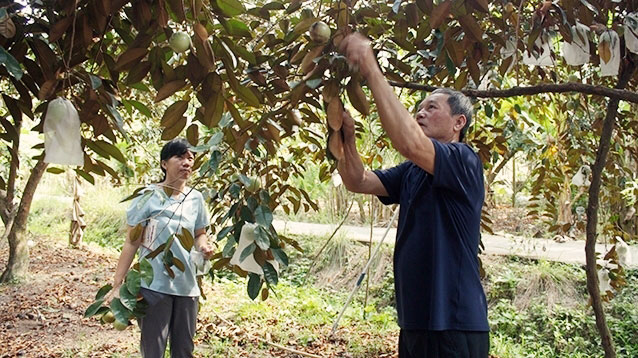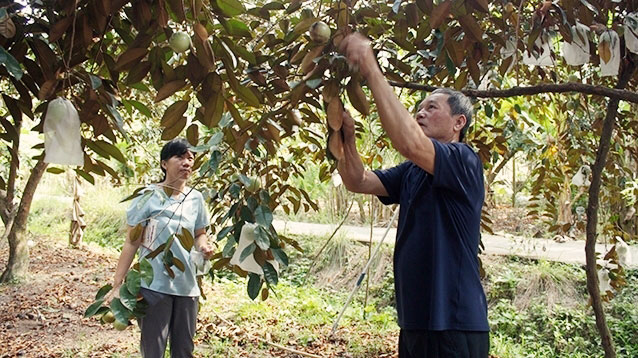


Since 2004, the Vietnam Farmer's Union has coordinated with the Danish NGO Agricultural Development Denmark Asia to support several farmers’ groups in Lao Cai, Tuyen Quang, and Hoa Binh provinces to approach and practice organic agriculture. From this initial step, up to now, 33 of the 63 provinces and cities nationwide have developed organic farming and aquaculture models.

Farmers in Tien Giang province cover star apples in preparation to export the fruit to the US. (Photo: NDO).
Following the global trend, since 2007, the total area of organic farming and aquaculture in Vietnam has increased from 12,120 ha to 76,666 ha. Organic agriculture, however, is not easy as agricultural enterprises are facing a range of challenges related to land, credit, support policies, and inputs.
Considerable balanced development
Throughout the country, organic agriculture is developing quite well, in which Bac Ninh is one of the typical localities. At the Giang Nam farm in Ngu Thai commune, Thuan Thanh district, Giang Nam Green Agriculture JSC has successfully applied a model of combined garden-pond-cage with new technology applied in breeding and farming, using EM bio-product which is synthesised from five effective microorganism groups developed by Japanese scientists. At present, the organic production line of Giang Nam Farm has produced a range of fresh meats, pate, and sausages that have appeared on the shelves of several clean product store chains in Hanoi, such as Dong Xanh and EcoFoods.
In the central region, TH Group also applies international standards from the American and European organic farms at its FVF (14.7 ha) and a pharmaceutical farm (20 ha) in Nghe An province. In December 2015, Control Union awarded USDA-NOP and EC 834/2007 for TH’s 37 clean vegetables and five herbs. Organic gac (baby jackfruit), centella asiatica, wild maracuja, and persimmon have been exported to the US market for herbal beverage processing. In 2016, the corporation also put into operation the largest organic dairy farm in Vietnam with more than 1,000 cows. To provide the standard feed for its cow herd, the group has invested in 328 ha of grasslands and organic maize in Nghe An.
Harvesting organic corn to feed cows at the TH True Milk organic farm in Nghia Dan district, Nghe An province. (Photo: NDO)
In the South, Nguyen Van Man, Head of Tien Giang province Department of Agriculture and Rural Development, said that after December 26, 2017, when the Ministry of Agriculture and Rural Development, in coordination with Tien Giang authorities, announced the first export batch of Vietnamese star apples to the US, the fruit eligible for exporting to the US market has been cultivated in nine local areas covering 120 ha, provided with special codes. According to experts, the star apple produced in such areas has improved quality, with pesticide residue limited at the allowed level without being infected. Two enterprises exporting star apples, Cat Tuong and Dai Lam Moc Companies, have identified the code plantation area for the local specialty. These two have exported 73 tonnes of star apples to the US and are continuing trading activities that have gained trust from their partners thanks to good control of production processes with modern irradiation and packaging equipment.
In My Khuong hamlet, My Tinh commune, Cho Gao district (Tien Giang), Le Van Thuy is following a dragon fruit production model in accordance with the Vietnamese Good Agricultural Practices (VietGAP). Thuy said that under the VietGAP model, local households and agricultural cooperatives have to carefully keep records of production and disease management throughout the whole process to abide by organic and biological directions. Although facing difficulties in making output for his products, Thuy and his family still maintain the model to control the residues of fertiliser and pesticides. In 2015, when My An dragon fruit cooperative started operating and sought a sustainable supply of dragon fruits for export, Thuy joined the cooperative and participated in the dragon fruit production model under GlobalGAP standards, with the whole process following biological manner. Then Thuy’s organic dragon fruit garden of nearly 1.7 ha was fully covered by the cooperative, offering him a stable consumption for his products at VND1,000 to VND3,000 per kg higher than the average market price. Thuy provides 50 to 70 tonnes of dragon fruits a year to the cooperatives, bringing an average value of VND800 million to VND1 billion, of which the profit is worth nearly VND500 million.
Challenges ahead
In theory, organic agricultural products ensure safety for both producers and consumers, but to produce organic products, agricultural enterprises have to overcome many difficulties. Strict management requirements in all process makes it both labour-intensive and costly to produce organic products. On the other hand, there is no clear distinction in the market for conventional and organic products, which can confuse consumers.
Moreover, in Vietnam, there is still no organisation capable of issuing certificates for organic products. Vietnamese agricultural products must seek approval from foreign organisations, such as IMO, JAS, Control Union, SKAL, ICEA and ACT, for organic certification. Notably, Vietnam still lacks national standards on organic evaluation to help improve product information transparency, thus helping build trust among consumers and increasing the competitiveness of organic products in both domestic and international markets. In addition, limited support policies for organic farming plus unfavourable weather also make it difficult for organic farming facilities.
A vegetable cultivation model using organic fertilisers in Phu Loc commune, Hau Loc district, Thanh Hoa province. (Photo: NDO)
In order to boost organic agriculture, the first step is to improve the institutions, mechanisms and policies that require the coordination of all economic sectors and farmers to overcome the current shortcomings and bring the highest efficiency in organic farming. It is necessary to build a comprehensive legal framework for organic farming, and on that basis, mobilise all economic sectors, enterprises, cooperatives and farmers to participate in the development of organic agriculture. In addition, there should be specific policies to attract foreign investment and support, including direct investment, management experience, and the application of scientific and technical advances.
On the other hand, it is necessary to develop a set of standards for organic agriculture in Vietnam with reference to the standards set by the International Federation of Organic Agriculture Movements and in line with the current standards adopted by the ASEAN countries under the ASEAN Standard for Organic Agriculture. At the same time, Vietnam should also refer to the standards from more fastidious markets to ensure its organic agricultural products meet the requirements of international market, for supplementing additional policies and schemes for organic agriculture development, regarding standards development, certification, organic inputs, capacity building, and incentives to assist farmers, enterprises and organic farming cooperatives.
One of the key issues for developing a sustainable and highly feasible organic agriculture is to encourage businesses investing in organic production, while raising awareness among enterprises, producers, and consumers on strict adherence to the organic farming process on a basis of selecting the products that have comparative advantages and are suited to local conditions to increase their value.
Notably, there should be a market expansion policy for organic products, such as offering financial support worth VND500 million per product for the development of key agricultural products produced in accordance with organic standards for domestic use and export, as well as increasing spending on trade promotion activities, like organising fairs on organic products and covering 50% of the cost for businesses participating in such events.
Source: NDO